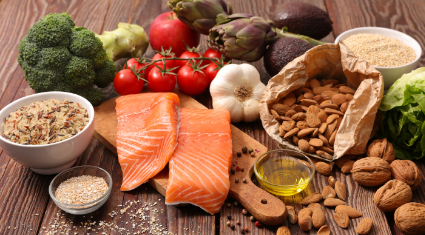Topics like ‘obesity’ and ‘ways to lose weight’ have gained so much popularity that many people seem to forget that being underweight also has health risks attached to it.
Are you seeking to know how to gain weight naturally? This article highlights ways to gain weight naturally as well as foods that can make you plump.
There are many weight loss programs nowadays, but why is there not much attention to weight gain? Is the idea of keeping fit only about losing weight?
Research suggests that there is a higher number of overweight people than underweight people.
According to a recent study, an assessment of Nigerian adults living in urban and rural settlements in Benue State showed that overweight and obesity are more prevalent than underweight in young adults.
However, this doesn’t erase the fact that underweight exists and can cause health problems. If underweight is your problem, you might want to know what you need to do to gain weight naturally. This article is for you as we would discuss why people might want to gain weight, what is a reasonable weight gain, healthy steps to weight gain and foods that can make you plump etc.

Most times, people get worried about their weight, and that is normal because, to a large extent, weight contributes to physical fitness. The question is, “Do you know your weight?” If you do, are you underweight, overweight, or in the normal range?
While there are various underweight symptoms, there is a standard way to know if you are underweight or not. The standard metric for measuring weight, called Body Mass Index (BMI), will show which weight category you belong to.
Body mass index (BMI) measures body size by measuring an individual’s weight with respect to height. You calculate your BMI by dividing your body weight (in kilograms) by the square of your height (in metres).
I.e., BMI = Kg/m (squared)
After calculating, you compare your number to standardized BMI scores.
According to this classification system, people whose BMI falls to 18.5 or below are classified as underweight. However, this is not a diagnostic measure; doctors sometimes evaluate weight to determine if an individual needs to gain additional weight in order to improve their health.
You can use our FREE BMI calculator to know if your weight is healthy for you.
Aside from BMI, signs and symptoms of being underweight include:

In order to gain weight naturally and in a healthy manner, it is important to gain the most calories from nutritious whole foods. Remember that weight gain occurs when calories consumed exceed the calories burned daily.
But the question here is, “What is the daily calorie need for the average adult?”
The average adult’s daily calorie needs range from 1600-2400 calories per day for women and 2000-3000 calories per day for men.
Calorie needs differ from person to person, as certain factors determine an individual’s calorie needs. Some of the factors that determine the number of calories you should consume include:
Gender
Age
Height
Level of activity
Even though it is advisable for underweight people to gain some weight, it doesn’t mean you should go around eating everything you see and gulping down every drink. Gaining excessive weight within a short time can throw you on the other side of the scale- the overweight side.
In your quest to seek answers to how to gain weight naturally, do not go overboard. Aim to gain 0.2-0.9 kg per week, as that is an acceptable rate of weight gain.
If you are aiming for about 0.5 kg per week, that means you are to add about 500 calories to your weight maintenance calorie needs daily. Your daily weight maintenance need is a sum of the calories you need for your daily activities, your basal metabolic rate, as well as the calories needed to support exercise. It would help to have a doctor or nutritionist help you calculate and figure this out.
Are you wondering why it is vital for some people to gain weight? The fact is that while being overweight has become a significant public health concern, being underweight can also pose a threat to an individual’s health. Thus, weight gain might be a necessity for someone who is underweight.
Apart from being underweight, there are other reasons why people seek natural ways to gain extra weight. Some situations where people seek to gain or regain weight include:
There are different weight gain strategies, but here we will be specifically addressing how to gain weight naturally while also pointing out nutrient-rich foods that can make you plump and healthy.
Below is a guide on how to gain weight naturally.
Determine your body type
Our body differs from individual to individual. While significant weight gain comes easily for some people, weight gain might not be reasonable, sustainable, or even healthy for others.
Also, factors like genetics play a major role in an individual’s physical build and musculature. In other words, body physique can be inherited. When you understand your body’s type, it would help you plan your weight gain strategies.
Eat the right diet
In order to gain weight naturally and in a healthy manner, you have to eat the proper meals. You shouldn’t consume every type of food, as some are quite harmful to your health.
Opt for nutrient-rich foods that also support weight-gain, such as fruit and vegetable smoothies, milk, rice, seeds and nuts, potatoes and starches, salmon and oily fish, whole grain bread, healthy cereals (e.g., oats, bran, granola, multigrain), dark chocolate, cheese, whole eggs, and full-fat yoghurt.
Avoid eating calorie-empty foods like junks in the form of refined sugar. Some fats are unhealthy and harmful to you. Unhealthy fatty foods (foods containing saturated and trans fats) should be avoided.
Eat more frequently
For people trying to lose weight, it is suggested that they go on intermittent fasting while watching their food portion sizes. However, for people who want to gain weight naturally, the reverse is the case. It would help if you ate more frequently.
Eat 5-6 smaller meals during the day rather than 2-3 large meals. Also, eat healthy treats/snacks in between meals.
Don’t forget to exercise

Are you surprised to see exercise listed as one of the ways to gain weight naturally? Exercise is so important that you need it both when you want to lose weight and when you want to gain weight.
The fact is that exercise is for everyone, but some workout styles and routines target a specific purpose. For instance, exercise can help you lose weight and body fat; in a similar vein, it can help build muscle mass, leading to weight gain.
Another way exercise might help with natural weight gain is by stimulating appetite and inducing hunger. When you are hungry and have the desire to eat, you tend to eat more food portions or at more frequent intervals, favoring your weight gain journey.

The calories in our diets come from three macronutrients:
While carbohydrates and proteins provide four calories per gram of the food we eat, fats provide nine calories per gram.
The Institute of Medicine of the National Academies has also set the Acceptable Macronutrient Distribution Ranges (AMDRs) as a calorie-intake guide for people.
According to Acceptable Macronutrient Distribution Ranges, the recommended calorie distribution is as follows:
This means that people are to get 45-65 percent of their calories from carbohydrates, 10-35 percent of their calories from protein, and 20-35 percent of their calories from fat.
3000 Calorie Diet Macronutrient Distribution
For someone who wants to gain weight naturally, meeting their nutritional needs can be a challenge. However, meal planning can help ensure that you meet your personal daily values.
You might also need to follow a 3000-calorie diet. Below are values to work with, showing the number of calories per gram you need from each macronutrient.
Nutrient-rich foods
Nutrient-rich foods contain many nutrients but relatively few calories and, as such, require a larger volume of food to consume up to 3000 calories per day.
Calorie dense foods
It is relatively easier to consume 3000 calories from highly processed, refined foods as they are highly palatable and calorie-dense. However, these ‘junk’ foods lack important nutrients for health.
If most of an individual’s diet consists of whole, nutrient-dense foods, a few sweets and treats may be enjoyed occasionally.
Natural food sources for healthy weight gain
A proper diet is one of the ways to gain weight naturally. Below are some natural food sources that can make you plump when consumed.
Animal-based protein for natural weight gain
Plant-based protein for natural weight gain
Grain foods for weight gain
Dairy products for weight gain
Fats and oils food sources for weight gain
Fruits for weight gain
Vegetables for weight gain
Conclusion
Healthy weight gain depends on several factors such as gender, body type and activity level. However, the good news is that by eating healthy, nutritious meals and adopting certain meal practices, you can attain weight gain naturally.
Whole, unprocessed or minimally processed food should make up the bulk of your diet. You should limit the consumption of highly processed, refined foods.
Telemedicine gives you access to medical professionals services and facilities. Telemedicine is a way to get medical advice that you will need throughout your journey to gain weight naturally.
Just from the comfort of your home, through information and communication technology, your conditions are diagnosed, treated, and followed on without having to inconvenience yourself that much. Telemedicine offers mutual trust between medical professionals and you; do not hesitate to consult a doctor or a nutritionist for guidance.
1. What can I eat to be plumpy?
Foods that can help you gain weight naturally:
2. What is the fastest natural way to gain weight?
Here are ten more ways to gain weight naturally:
3. Which fruit is best for weight gain?
Fruits are high in calories and can help you gain weight naturally.
4. Why is my body so skinny?
Your low BMI could be inherited from your tiny stature at birth. Even if you consume high-calorie foods, you can have a very high metabolism and find it difficult to gain weight. If you are unable to eat wholesome foods, you might not maintain a balanced, healthy diet.
5. Why is it difficult to gain weight?
Your inability to gain weight can hinge on some factors. The factors can be:
6. How to gain appetite fast?
The following advice could boost interest in eating and stimulate appetite:
Try to eat six to eight modest meals and snacks each day.
References
healthcareFebruary 27, 2025
healthcareAugust 20, 2025








